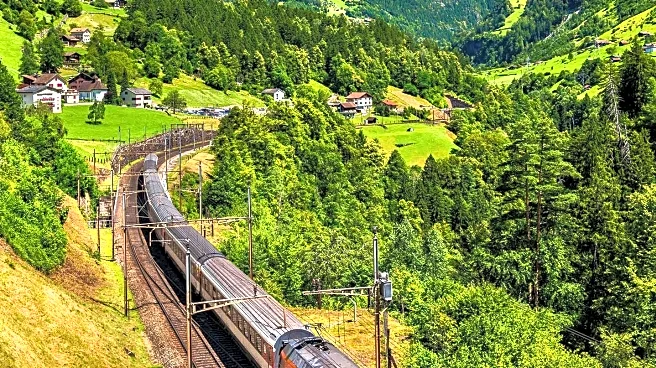What's Happening?
German travelers are increasingly opting for train travel as a sustainable and eco-friendly alternative to air travel. According to a study conducted by TUI in partnership with Appinio, 34.9% of German travelers surveyed prioritize natural landscapes when choosing a destination, indicating a shift towards environmentally conscious travel. Train travel offers a slower, less polluting journey, allowing travelers to enjoy scenic views and avoid the chaos of airports. This trend is expected to grow as travelers seek authentic and sustainable experiences, with popular destinations like the Black Forest and Bavarian Alps likely to see increased visitor numbers.
Why It's Important?
The shift towards train travel among German tourists highlights a growing trend in sustainable tourism, which could have significant implications for the travel industry. As travelers prioritize eco-friendly options, there may be increased demand for train services and infrastructure improvements. This trend also reflects a broader societal shift towards environmental consciousness, potentially influencing travel policies and industry practices. Businesses in the travel sector may need to adapt to these changing preferences by offering more sustainable travel options and experiences.
What's Next?
As the trend towards eco-friendly travel continues, travel companies and destinations may focus on enhancing train travel experiences and promoting sustainable tourism practices. This could involve investing in greener technologies, expanding train routes, and developing eco-friendly accommodations. Additionally, there may be increased collaboration between travel agencies and environmental organizations to promote responsible tourism. The growing interest in sustainable travel could also lead to policy changes aimed at reducing the carbon footprint of the tourism industry.
Beyond the Headlines
The rise of train travel as a preferred mode of transportation among German tourists may encourage other countries to adopt similar sustainable travel practices. This could lead to a global shift in tourism strategies, emphasizing environmental conservation and cultural preservation. The trend also highlights the importance of balancing tourism growth with ecological sustainability, prompting discussions on how to achieve this balance effectively.











